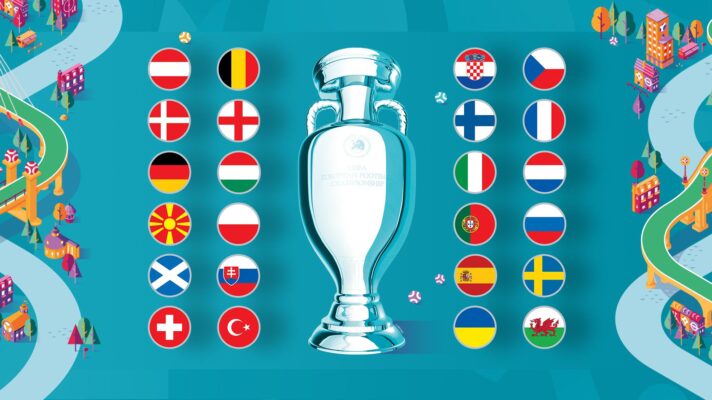
The delayed tournament kicks off in Rome on Friday with a total of 24 teams playing across 11 cities.
![Rome will host the opening game of the tournament on Friday [Guglielmo Mangiapane/Reuters]](https://www.aljazeera.com/wp-content/uploads/2021/06/2021-06-07T130227Z_775149745_RC2LVN9OU22E_RTRMADP_3_SOCCER-EURO-ITALY.jpg?resize=770%2C513)
The UEFA Euro 2020, postponed from last year due to the coronavirus pandemic, kicks off on Friday, with Turkey taking on past winners Italy in Rome.
When the action gets under way in front of a planned 16,000 fans at a quarter-full Stadio Olimpico, the overwhelming feeling for European football’s governing body, UEFA, will be of relief following the unprecedented decision to put the tournament on hold last year.
Portugal, who are grouped with Hungary and past winners France and Germany, are the defending champions, having won the 2016 edition.
The tournament kicks off on Friday, June 11. The knockout phase starts on June 26 with the final taking place on July 11 at London’s Wembley Stadium.
For the first time in the tournament’s history, it will be taking place across the continent with 11 host cities in all: London, Saint Petersburg, Baku, Munich, Rome, Amsterdam, Bucharest, Budapest, Copenhagen, Glasgow and Seville.
A total of 24 teams divided into six groups will be taking part in the tournament, which comprises 51 matches.
Group A: Turkey, Italy, Wales, Switzerland
Group B: Denmark, Finland, Belgium, Russia
Group C: Netherlands, Ukraine, Austria, North Macedonia
Group D: England, Croatia, Scotland, Czech Republic
Group E: Spain, Sweden, Poland, Slovakia
Group F: Hungary, Portugal, France, Germany
The top two teams from each group, plus four best third-place finishers, will progress to the round-of-16 phase which will be followed by the quarterfinals, semifinals and the final.
Yes. Each of the 11 venues has been given clearance to host fans. UEFA confirmed that Saint Petersburg and Baku will have up to 50 capacity; Budapest aims to host a full house; Amsterdam, Bucharest, Copenhagen, Glasgow, Rome and Seville will be hosting 25 to 45 percent; London will have a minimum capacity of 25 percent; Munich aims to host approximately 22 percent of the stadium capacity.
Dublin and Bilbao were dropped from the list of host cities after refusing to give guarantees over spectator numbers, but Seville stepped in for the latter while Dublin’s games went to London and Saint Petersburg.
Despite the pandemic-forced delays, UEFA president Aleksander Ceferin has been bullish, insisting Euro 2020 will be safe.
“It will be the perfect opportunity to show the world that Europe is adapting. Europe is alive and celebrating life. Europe is back,” he said recently.
On Sunday, Spain captain Sergio Busquets tested positive for COVID-19 and left their training base. It comes after the Netherlands dropped goalkeeper Jasper Cillessen from their squad because of a positive test.
Concerns over possible virus clusters led to UEFA allowing nations to name expanded squads of 26 players.
